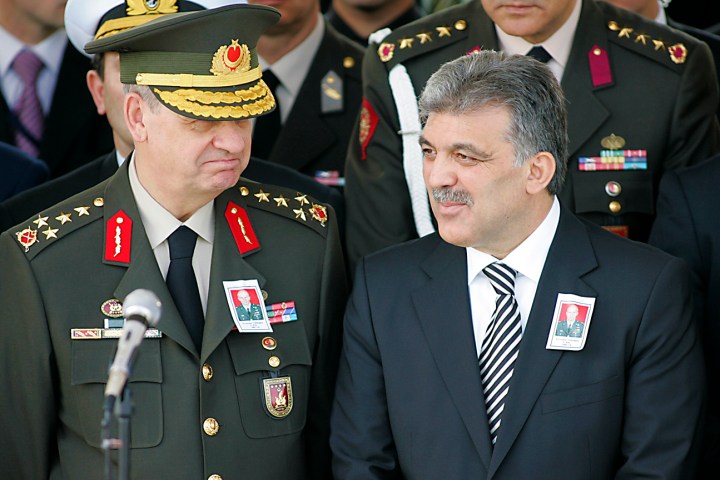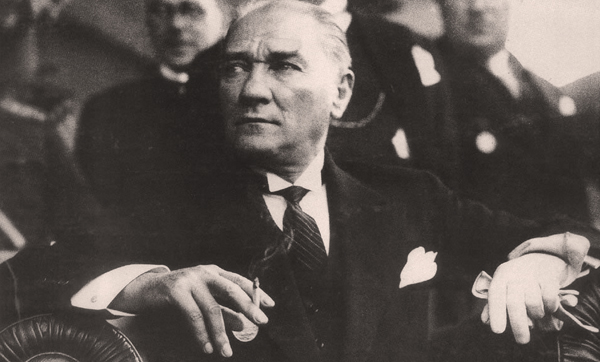Politics
Turkey arrests generals, confronts inner demons

In the past several days, Turkey’s long-simmering military/Islamist tension surfaced yet again. On Monday night, dozens of serving and retired officers were arrested, including some of the country's highest-ranking former generals and admirals. But while Turkey's precious stability may have been temporarily endangered, not everything is doom and gloom.
The arrests were part of a broader government movement against a shadowy ultra-nationalist movement accused of plotting the overthrow of the country’s current secular, but Islamist-inspired and orientated government. According to government sources, the plotters hoped to undermine the now-ruling Justice and Development Party and eventually create an atmosphere that would support a new coup. Turkey’s Taraf newspaper says that last month it gave criminal prosecutors a cache of some 5,000 documents, along with CDs, tapes and PowerPoint presentations all documenting the purported details of the plot, as well as lists of journalists – alternatively to be relied upon as supporters or arrested in a coup.
Speaking separately about the plot and the arrests, Prime Minister Recep Tayyip Erdogan (on a visit to Spain) and President Abdullah Gül took pains to wave off any claim of the ruling government’s involvement in the arrests, putting the responsibility for the investigations and arrests back on criminal prosecutors.
These most recent arrests and the accusations of a military plot point to a sharp split in Turkish opinion. According to analysts, many Turks see this as something that is long overdue – bringing to heel the unelected officers who have carried out coups, assassinations and repression over decades. Others, however, see these charges as the way the government will undermine the key institution that established and now protects modern Turkey’s secular foundations.
Contemporary Turkey’s political life is in turmoil, but the country lies on ground that has been home to a progression of some of the world’s great civilisations. These include the Hittites, Assyrians, Babylonians, Persians, Greeks, Romans, Byzantines, and, finally, the Seljuk Turks and Ottomans. When the Ottoman star dimmed in the 17th century after the 1683 siege of Vienna was repulsed by Saxon and Polish armies, the once resplendent, powerful Ottoman Empire began its downward spiral to become the “sick man of Europe”.
Territory after territory was sliced away by its Russian and Habsburg rivals; independence movements in Greece – and then the rest of the Balkans – shrank the Ottoman Empire further. The UK, Italy and France took much of what remained in Ottoman hands. By the early 1900s, after several traumatic military defeats, the so-called “Young Turk” movement attempted to re-energise the Sublime Porte’s flailing government, moved closer to Germany and then disastrously joined the Central Powers in World War I.
In defeat, the remnants of the Ottoman Empire were handed over to the Allies. Facing virtual occupation, one of the country’s few successful generals, Mustafa Kemal (then, later, renamed Kemal Ataturk, “Father of the Turks”) led the effort to establish a modern, secular nation. He outlawed the traditional fez hat and imposed modern Western dress as a symbol of the country’s break with the past. The Roman alphabet replaced a mixed Arabic/Persian script and a full range of Western-style governmental institutions were established. Turkey has evolved since then into a Near East anomaly: a Muslim nation with no established state religion; a non-Arab nation and ally of Israel; a Nato member with the alliance’s second-largest military; and a would-be EU candidate member.

Photo: The father of modern, secular Turkey, Kemal Ataturk.
But long-term political stability continues to elude Turkey, with unresolved issues deeply etched into its social fabric. Turkey continues to be split between modern secularists and devout Muslims, who press for a religious texture to their state. The continuing effect of Turkey’s long-term repression of its Kurdish population (derisively labelled “Mountain Turks” by the government); a deep, centuries-old suspicion of Greece; and the attendant conflict over Cyprus, and a continuing animosity between Turks and Armenians that reaches back (at least in the modern era) to Turkish pogroms against its subject Armenian population during World War I are further problems.
Foremost, of course, is the unresolved political question of how to achieve a convincing national consensus on the role of the country’s military in the contemporary nation – nearly 100 years after Ataturk’s system was installed. The Turkish military clings to its role as protector of the modern Turkish state against domestic and international enemies, intervening to depose three elected governments and executing prime minister Adnan Menderes, the leader of Turkey’s first opposition party, in 1961.
The origins of today’s Turkey – economically growing and increasingly diverse – reach back 30 years to the era of prime minister Turgut Ozal. Ozal opened up the Turkish economy, creating a manufacturing boom and encouraging more traditional rural Turks to the cities for jobs. This population shift, together with growing wealth among the traditional Muslim middle class, strengthened democracy and reduced the forces for radicalism.
As a result, Turkey’s key political fissure now is between politicians from the older, traditional and more pious middle class, and an elite bureaucracy and increasingly cosmopolitan population in big cities. The latter argue Turkey has outgrown the need for the military to intervene in politics, while the military’s supporters continue to maintain that politicians cannot be trusted to keep Islam out of the running of the state.
But this time around, assuming the plot was real, elements of the military may well have fatally overreached themselves. The swiftness and emphatic way the state dealt with those involved could mean that, in future, this will be remembered as the moment when the political balance of power in Turkey decisively moved from the soldiers to the civilians.
By J. Brooks Spector
Read more at the New York Times here and here, the AP, the CIA World Fact Book and Wikipedia
Main photo: Turkey’s President Abdullah Gul (R) talks to Land Forces commander General Ilker Basbug (L) during the funeral of Turkish army officer Major Ercument Turkmen at Kocatepe Mosque in Ankara April 26, 2008. REUTERS/Umit Bektas






 Become an Insider
Become an Insider